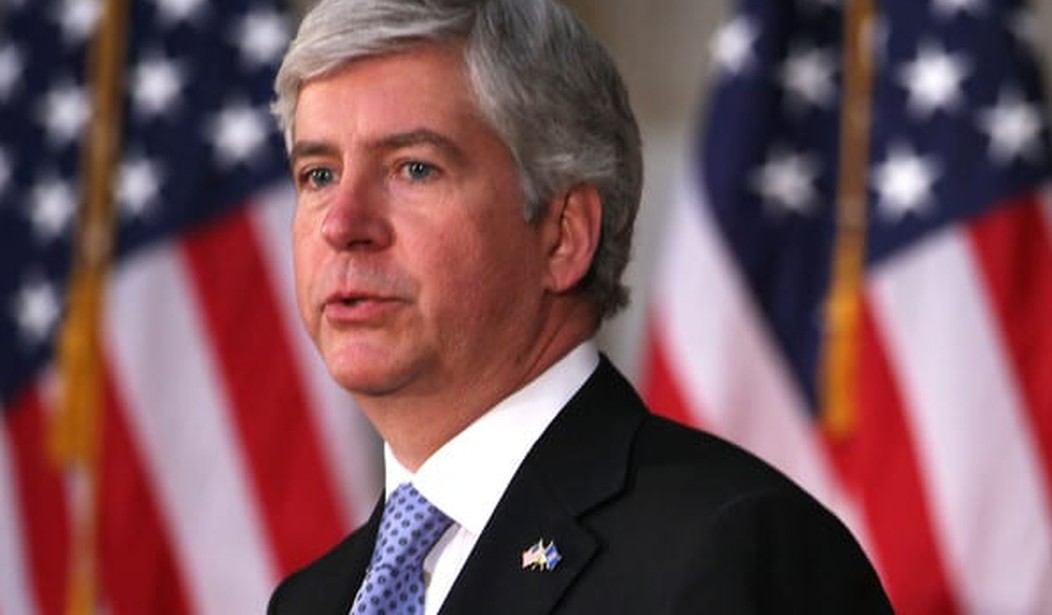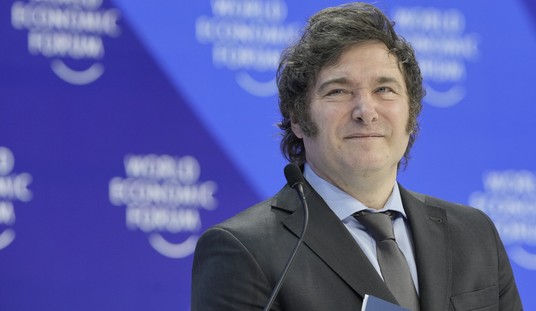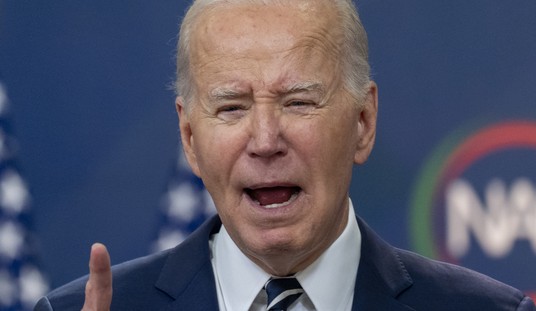The Michigan gubernatorial campaign is so tight that Gov. Rick Snyder (R-Mich.) is no longer telling voters their state is the “comeback state,” and his campaign may have even electronically changed his voice in their TV and radio commercials to make the message more pleasing to voters’ ears.
A Public Policy Polling (PPP) survey released Sept. 9 showed 51 percent of voters disapprove of Snyder — no matter the timbre of his voice — compared to the 43 percent who are happy with his record in office.
PPP does have Snyder in the lead against his Democratic Party challenger Mark Schauer overall, 43-42 percent. The one-point spread is within the poll’s margin of error.
A Detroit News-WDIV poll has Snyder in first place by less than two points, 43.6 percent to 41.8 percent for Schauer.
It could be those numbers have impacted the way Snyder sounds in his latest ad, titled “Numbers.”
Snyder’s voice in the “Numbers” ad does sound deeper than his voice did when he delivered his State of the State address Jan. 7, 2014.
The Schauer campaign was quick to jump on the issues that have soured many Michigan voters on Snyder.
Schauer brought a room full of cheering, applauding, foot-stomping United Auto Workers union members and Democrats to their feet when he promised to repeal Michigan’s right-to-work law if elected as the state’s next governor.
“Like some of my brothers and sisters in this room I was there on that cold December day in 2012 when those cowards in the (Michigan) State Capitol building locked you out and locked things down,” Schauer said. “I was there to protest and I got pepper sprayed to prove it.”
The reaction among the party faithful and union members was not surprising. They were blindsided by Republican Party and Michigan Chamber of Commerce officials who rammed right-to-work legislation through the Michigan Legislature and onto Snyder’s desk in December 2012.
Snyder had said only a few months before that right-to-work legislation was not on his agenda. But before Democrats could blink, the GOP had it on his desk and Snyder was signing the package into law.
Those in the Grand Rapids, Mich., union hall aren’t the only Michigan residents supporting Schauer’s call for an end to right-to-work.
The Democratic-leaning Public Policy Polling survey released Sept. 9 shows 48 percent of registered voters in Michigan want right-to-work legislation to be abolished and would vote to repeal the law if it appears on a ballot. Thirty-six percent of those who responded said they supported right-to-work.
The PPP survey showed Michigan voters also oppose another of the signature achievements of the Snyder administration. They oppose the so-called “pension tax,” which Democrats say allowed for drastic cuts in business taxes, by 74-17 percent.
Snyder stood by the decision to, for the first time, subject pensions to the Michigan state income tax during a speech to senior citizens earlier this year.
The PPP survey also showed Michigan voters support raising the state’s minimum wage to $10 an hour.
Snyder and the Republican-controlled state legislature blocked a November ballot proposition in May that would have raised the minimum wage to $10.10.
The legislature scrapped the state’s old minimum wage law and then approved a new law.
The petitions calling for a November vote on the $10.10 proposal were based on amending the old law. Since that law didn’t exist after the legislature’s May vote, the petitions were useless.
The new Michigan minimum wage law raises the baseline to $9.25 by 2018.
There is one issue where Snyder is winning support across party lines. Voters do support Snyder’s Medicaid expansion program, known as “Healthy Michigan.” Five months after it took effect, voters support the program by 50-26 percent.
What was a cakewalk to victory in November 2010 — when Snyder had no political record at all —has turned into a stroll over hot coals in November 2014.
In other polls, Michigan voters have said they disagree with the notion that Michigan’s economy is strong and Snyder has brought the state back from the depths of the Great Recession.
As the Detroit News reported, the Snyder team has changed its campaign theme in the last flight of TV ads.
The ads no longer refer to Michigan as the “comeback state.” Instead, Michigan is referred to as “being on the road to recovery.”
Snyder narrated the ad himself — with a voice somewhat deeper than Michigan voters are used to hearing — and assured his audience that he is an accountant, so he understands numbers.
Referring to Michigan’s economy recovery, he assures his audience, “You might not feel it yet, but you soon will.”
But whose voice is it? It does sound different.
MLive.com columnist Tim Skubick raised the possibility the Snyder campaign used electronics to modify the governor’s voice after Geoffrey Fieger, once the attorney for suicide advocate Jack Kevorkian, said it was “a voice made for lip sync.”
A Snyder campaign official said nothing was done to make Snyder’s voice more pleasant, with this qualifier – “to my knowledge.”
Whether Snyder’s voice was electronically modulated or not, the Schauer campaign jumped on the change from “comeback state” to “road to recovery,” arguing that it is proof Snyder’s policies are not working for the middle class.
“The fact that Snyder is lecturing voters about when they’ll ‘feel’ a recovery, and complaining about not getting enough credit just shows that this governor is not on the side of regular people,” said Cathy Bacile Cunningham, Schauer’s press secretary.
Saul Anuzis, a former chair of the Michigan Republican Party, said, as reported by MLive.com, that Schauer was “waging class warfare” trying to turn the campaign into a “rich guy versus the regular guy” battle.
Schauer doesn’t seem to have any problem with that. He said in his first campaign TV ad that began running in August, “As governor, I’ll cut middle class taxes, reverse Governor Snyder’s education cuts, and get rid of tax breaks for companies that send our jobs overseas.”
“It’s looking more and more like the Michigan Senate race might be off the board as Gary Peters pulls away,” said Dean Debnam, the president of Public Policy Polling. “But the race for governor looks like it will provide plenty of excitement.”








Join the conversation as a VIP Member